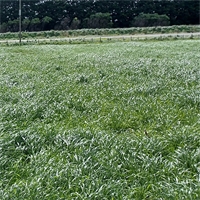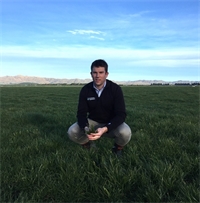24Oct
Harnessing the sun: embracing solar energy on farm
As energy prices continue to rise, and environmental consciousness grows, solar energy emerges as a leading option - ensuring that farmers can reap the rewards of their investment for decades to come and pave the way towards the next generation of sustainable agricultural practices.
Under the lens of environmental responsibility, farmers are increasingly turning their attention towards sustainable practices. Now, more than ever, the agricultural sector has a unique opportunity to take charge of their energy needs, reduce costs, and make positive impacts. The installation of solar systems has emerged as a smart play for the industry, particularly in applications that are energy-hungry, most notably dairy, irrigation, and processing.
In the 2021 season, the average Canterbury dairy farm’s operating expenses amounted to $5.25 per kilogram of milk solids. Irrigation costs including electricity were 31¢/kgMS, while additional electricity use was 9¢/kgMS. With an appropriately sized and modelled solar array, we can expect to slash energy consumption by up to 50% or more—which quickly adds up to tens of thousands of dollars annually. Green finance options are becoming more prevalent and can allow investment in solar without a large capital outlay or tying up cashflows, so farmers are still able to allocate resources to other essential areas. An investment in solar has become increasingly more attractive—with a payback period of as little as five years, and a life span of up to 30 years, the benefits extend far beyond the initial investment.
It’s not just the farming community that has a vested interest in responsible stewardship of the land and is poised to take considerable steps towards reducing its carbon footprint— dairy giants like Fonterra and Nestlé are also pushing the increased importance of low carbon supply chains. As we continue to head towards further decarbonisation, farmers need more tools to be able to offset emissions. Solar energy can provide an ideal means in helping to achieve this through its straightforward monitoring and reporting practices.
With the government heavily pushing for electrification in the coming years, changes in energy prices are going to reflect this increased demand. Solar energy generated on-farm will offset consumption—feeding the farm loads first, and any excess solar generation being exported back to the grid for a credit. This allows for a build-up of credit over winter months when energy demand is lower on farm, which can help to further offset peak season consumption. Platinum Energy is also able to implement other measures to help maximise self-consumption and improve your return on investment, such as diverting excess solar towards water heating, acting as a cost-effective means of energy storage, or by providing solutions for sharemilker arrangements.
“Now, more than ever, the agricultural sector has a unique opportunity to take charge of their energy needs, reduce costs, and make positive impacts.”
So, while decarbonisation efforts are widespread, decisions that make financial sense are still key. On an upward trajectory, energy costs continue to place a burden on operational expenditure – far from an incidental item in the farm budget. Providing an endless supply of renewable energy that can be harnessed for years to come, solar allows for a degree of energy independence for farmers, offering stability and predictability, and a shield from the volatility of traditional energy prices.
To find out more about how solar can work for your farm, contact Ruralco Energy on 0800 787 256 or Platinum Energy on 03 349 2783.
THIS PROMOTIONAL FEATURE WAS PROVIDED BY PLATINUM ENERGY
Related

Catch crops, also commonly referred to as cover crops, are nothing new. Already used extensively in ...
Read More

Streamlining efficiency and embracing technology underpins continued investment at the Mawle family’...
Read More

Rugby has taught me heaps about how to look after yourself and handle stress. I reckon rugby and far...
Read More

FMG began their partnership with Melanoma New Zealand a couple of years back, helping to share life-...
Read More

The latest perennial ryegrass from one of the country’s best-known pasture companies sets a new ben...
Read More

Jason and Clare Nish have successfully grown maize in Mid Canterbury over the past ten years.
Read More